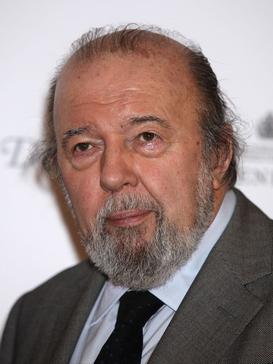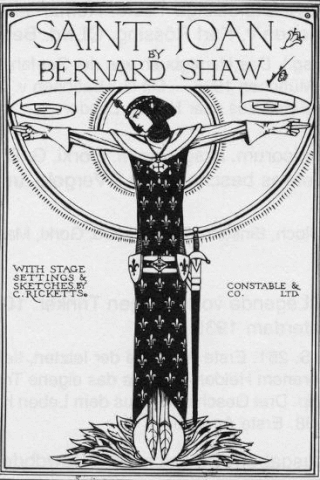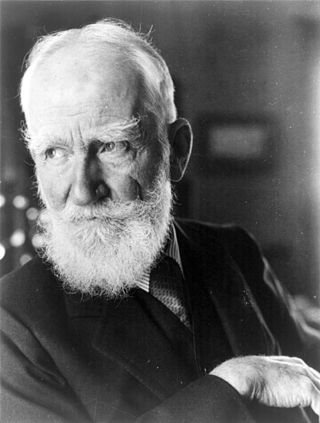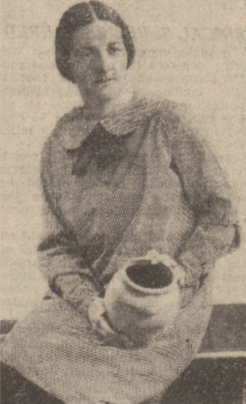
Arms and the Man is a comedy by George Bernard Shaw, whose title comes from the opening words of Virgil's Aeneid, in Latin: Arma virumque cano.

Sir Ralph David Richardson was an English actor who, with John Gielgud and Laurence Olivier, was one of the trinity of male actors who dominated the British stage for much of the 20th century. He worked in films throughout most of his career, and played more than sixty cinema roles. From an artistic but not theatrical background, Richardson had no thought of a stage career until a production of Hamlet in Brighton inspired him to become an actor. He learned his craft in the 1920s with a touring company and later the Birmingham Repertory Theatre. In 1931 he joined the Old Vic, playing mostly Shakespearean roles. He led the company the following season, succeeding Gielgud, who had taught him much about stage technique. After he left the company, a series of leading roles took him to stardom in the West End and on Broadway.

Sir Peter Reginald Frederick Hall CBE was an English theatre, opera and film director. His obituary in The Times declared him "the most important figure in British theatre for half a century" and on his death, a Royal National Theatre statement declared that Hall's "influence on the artistic life of Britain in the 20th century was unparalleled". In 2018, the Laurence Olivier Awards, recognizing achievements in London theatre, changed the award for Best Director to the Sir Peter Hall Award for Best Director.

Candida, a comedy by playwright George Bernard Shaw, was written in 1894 and first published in 1898, as part of his Plays Pleasant. The central characters are clergyman James Morell, his wife Candida and a youthful poet, Eugene Marchbanks, who tries to win Candida's affections. The play questions Victorian notions of love and marriage, asking what a woman really desires from her husband. The cleric is a Christian Socialist, allowing Shaw to weave political issues, current at the time, into the story.

Saint Joan is a play by George Bernard Shaw about 15th-century French military figure Joan of Arc. Premiering in 1923, three years after her canonization by the Roman Catholic Church, the play reflects Shaw's belief that the people involved in Joan's trial acted according to what they thought was right. He wrote in his preface to the play:
There are no villains in the piece. Crime, like disease, is not interesting: it is something to be done away with by general consent, and that is all [there is] about it. It is what men do at their best, with good intentions, and what normal men and women find that they must and will do in spite of their intentions, that really concern us.
Francis Edward Paxton Whitehead was an English actor and theatre director. He was nominated for a Tony Award and a Drama Desk Award for his performance as Pellinore in the 1980 revival of Camelot. He had many Broadway roles. He was also known for his film roles and was well known, especially to U.S. and television audiences in general, for his many guest appearances on several U.S. shows such as portraying Bernard Thatch on The West Wing and often appeared in recurring roles and guest appearances on major sitcoms of the 1990s, such as Frasier, Caroline in the City, Ellen, 3rd Rock from the Sun, The Drew Carey Show, Mad About You, and Friends.
John Doyle is a Scottish stage director of musicals and plays, as well as operas. He served as artistic director at several regional theatres in the United Kingdom, where he staged more than 200 professional productions during his career spanning over 40 years.

Sir Barry Vincent Jackson was an English theatre director, entrepreneur and the founder of the Birmingham Repertory Theatre and, alongside George Bernard Shaw, the Malvern Festival.

Thousands of performances of William Shakespeare's plays have been staged since the end of the 16th century. While Shakespeare was alive, many of his greatest plays were performed by the Lord Chamberlain's Men and King's Men acting companies at the Globe and Blackfriars Theatres. Among the actors of these original performances were Richard Burbage, Richard Cowley, and William Kempe.

The Irish Repertory Theatre is an Off Broadway theatre founded in 1988.
Barry Albert Kyle is an English theatre director, currently Honorary Associate Director of the Royal Shakespeare Company, England.

In Good King Charles's Golden Days is a play by George Bernard Shaw, subtitled A True History that Never Happened.

Too True to Be Good (1932) is a comedy written by playwright George Bernard Shaw at the age of 76. Subtitled "A Collection of Stage Sermons by a Fellow of the Royal Society of Literature", it moves from surreal allegory to the "stage sermons" in which characters discuss political, scientific and other developments of the day. The second act of the play contains a character based on Shaw's friend T. E. Lawrence.

Viola Lyel was an English actress. In a long stage career she appeared in the West End and on Broadway, for leading directors of the day, including Sir Barry Jackson, and Nigel Playfair. Her roles ranged from Shakespeare and Restoration comedy to melodrama and drawing room comedies.

Birmingham Repertory Theatre, commonly called Birmingham Rep or just The Rep, is a producing theatre based on Centenary Square in Birmingham, England. Founded by Billie Lester, it is the longest-established of Britain's building-based theatre companies and one of its most consistently innovative.

The Festival Theatre, now known as Malvern Theatres, is a theatre complex on Grange Road in Malvern, Worcestershire, England. Malvern Theatres, housed in the Winter Gardens complex in the town centre of Great Malvern, has been a provincial centre for the arts since 1885. The theatre became known for its George Bernard Shaw productions in the 1930s and from 1977 onwards, along with the works of Edward Elgar. Up until 1965, 19 different plays of Shaw were produced at the Malvern Festival Theatre, and six premiered here, including The Apple Cart at the opening Malvern Festival in 1929, Geneva, a Fancied Page of History in Three Acts in August 1938 and In Good King Charles's Golden Days in August 1939.
The Malvern Festival was first held in 1929 and ran annually until 1939. It was founded by Sir Barry Jackson who also founded Birmingham Repertory Theatre.
Waldo Sullivan Lanchester was a British puppeteer who founded the Lanchester Marionettes (1935–1962), a puppet theatre that was based in Malvern, and later in Stratford-upon-Avon. He wrote a book on the revival of puppeteering and commissioned George Bernard Shaw to write his last completed play Shakes versus Shav in 1949. In 1952, Donald W. Seager wrote that "Waldo Lanchester has consistently been associated with all that is best in the puppet theatre." Archibald Henderson called him "England's greatest puppetmaster."
The Lanchester Marionettes, a professional puppet theatre, was co-founded in 1936 by Waldo and Muriel Lanchester. The 50-seat Lanchester Marionettes Theatre in Malvern, Worcestershire, England was “the only theatre in the country exclusively to be used for marionettes.” George Bernard Shaw’s final play, Shakes versus Shav, was written for the Lanchester Marionettes in 1949.

Muriel Lanchester was a British ceramicist and co-founder of the puppet theatre company, the Lanchester Marionettes. Lanchester and her husband, Waldo were the first British people to appear on French television, as part of the World's Fair in Paris in 1937. George Bernard Shaw’s final play, Shakes versus Shav, was written for the Lanchester Marionettes in 1949.











